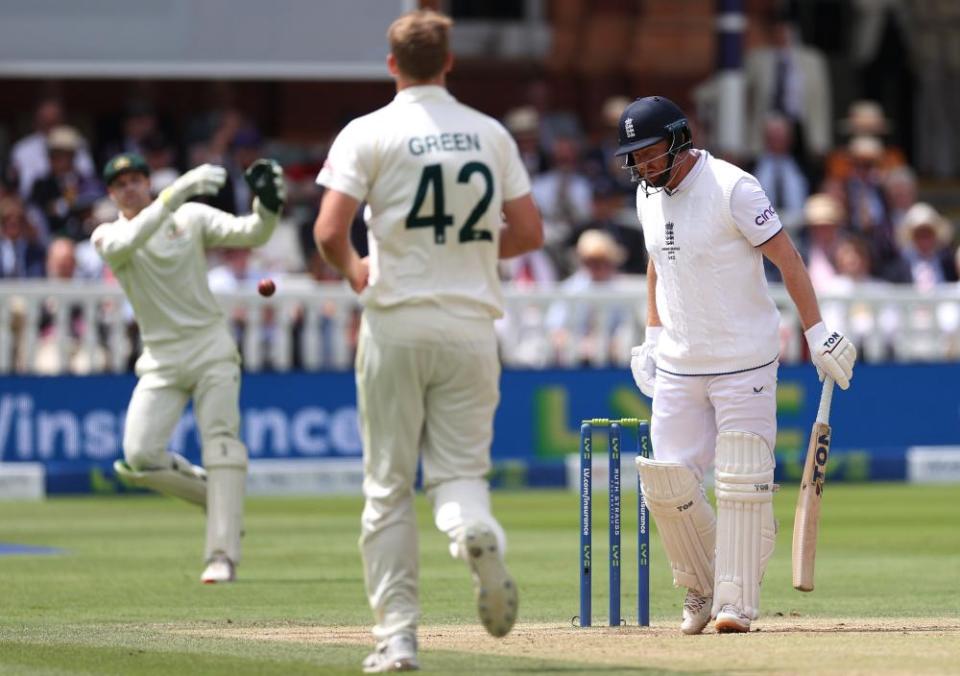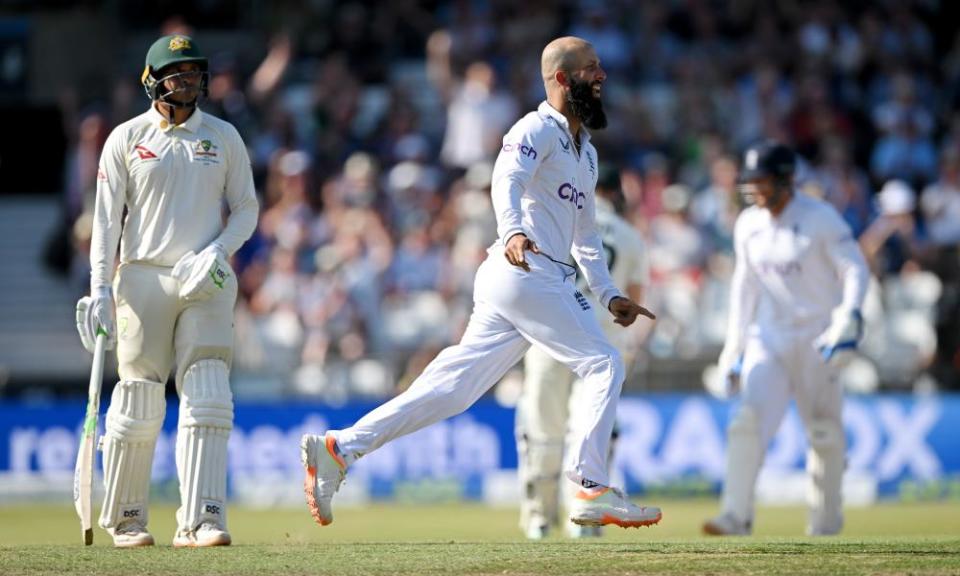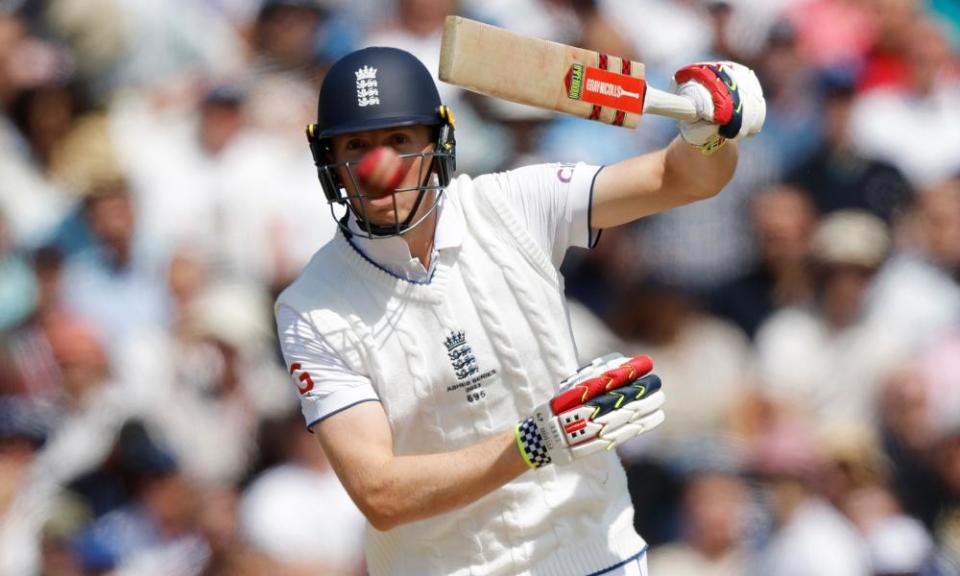Bairstow stumping to Broad bails: 15 moments that shaped the 2023 Ashes

At the end of an Ashes series we usually pick the 10 moments, big and small, that shaped the result – but there were so many sliding doors this summer that we could have picked 100. We’ve settled for 15, one for every six that Ben Stokes hit in the series against Australia.
1) Woakes’ red-ball gamble pays off
Chris Woakes had never played under Brendon McCullum and Stokes, but he gambled they might need a home banker during a sardine-can Ashes. He pulled out of the Indian Premier League so that he could play three Championship games for Warwickshire and get himself, in his words, “red-ball fit”. The decision ultimately brought Woakes something an IPL contract can’t buy: Ashes glory.
2) Stokes’ declaration of intent
Stokes’s statement declaration on day one at Edgbaston, when England were 393 for eight and Joe Root was at the buffet. No need to go over it again, except to note that without it we may well have had a result Stokes hates even more than defeat: a draw.
Related: Bold or brainless? Debate Ben Stokes’s tactics but don’t expect him to change | Andy Bull
3) Broad pays penalty for no-ball
In the first two Tests, a rusty England missed 12 chances in the field, conceded 118 extras and took two wickets with no-balls. One of the most damaging was Usman Khawaja, bowled by a Stuart Broad no-ball in the first innings at Edgbaston. Australia would have been 262 for six, still 131 behind, with their lower order exposed to the second new ball. Instead Khawaja made another 30 runs and, almost as importantly, hung around for another 32 overs.
4) Root stays on too long in first Test
When Root took a blinding return catch to dismiss Alex Carey, the first Test was apparently over. Australia were 227 for eight, chasing 281, and Pat Cummins had only “two No 11s” for company. Even though there were no left-handers at the crease, Stokes kept Root on. In his next over, Cummins muscled two sixes down the ground to instantly change the mood. Root didn’t bowl again, but it was too late.
5) Stokes lets crucial catch slip away
The England captain has spoken of only one regret all summer: dropping Nathan Lyon at Edgbaston. He seemed to have taken an astonishing catch at deepish square leg, only for the ball to slip out as he tried to clench his hand around it. Australia needed 37 to win at the time. By the end of the over Australia needed 30, having scored 21 from the previous 10 balls, and England were in trouble. They didn’t get another chance.
6) Lyon injury takes shine off win
Australia’s short-ball ploy turned the second Test at Lord’s, when England’s first innings unravelled in a burst of unapologetically happy hooking. But it came at a cost. At 180 for one, with Cameron Green bowling an exploratory spell of bouncers, Ben Duckett top-edged a hook. Lyon ran in, hoping to take the catch, and pulled his calf so badly that his series was over. In the short term it wasn’t a problem, as Australia doubled down on Bodyline and won the game. But over time, and despite a nerveless Ashes debut from Todd Murphy, they sorely missed Lyon’s nous, control (relatively speaking) and wicket-taking threat.
7) Carey controversy marks turning point
Of all the turning points in the series, Carey’s controversial, entirely legitimate stumping of Jonny Bairstow might be the biggest. Broad marched out to give every single Australian a mouthful, Stokes went on a deadpan rampage and England turned meek defeat into righteous failure. A desperation to win the next Test did something that has seemed impossible in recent years: it united the whole country.

8) Australia huddle slows down Stokes
After being pummelled for eight sixes in 10 overs by Stokes – all to the short leg-side boundary – Australia were facing an even grislier sequel to Headingley 2019. They had again lost the plot, but their group of senior players found it during an unscheduled tactics meeting at the end of the 66th over. They started to bowl wide of off stump, while also – duh – avoiding length balls that Stokes could launch into the crowd. Having hit 84 runs from the previous 57 balls, Stokes scored only seven from the final 38. He blinked first, tried to hit Josh Hazlewood to the long boundary and smashed the ball straight up in the air. There were three more wickets to take after that, but everyone knew the game was over.
9) Wood brings heat to England attack
In his first appearance of the series, at Headingley, Mark Wood poured some molten lava on the Ashes. A primal first spell, which included a 96mph delivery that gave Khawaja’s furniture a makeover, widened the eyes and scrambled the brains of Australia’s batters. The following day, with England dangling over the precipice after a miserable batting performance, Wood hooked his first ball – the first after lunch – for six. A defiant, haymaking 24 from eight balls sparked another Stokes rampage and a potential first-innings deficit of more than 100 was reduced to a manageable 26.
10) Moeen finds control when it counts
In an endearingly honest pre-series interview, Moeen Ali reminded everyone that control was not part of his skill set. “I’m expecting them to come after me, which could be dangerous because Stokesy likes having the fielders up. It could go for a lot of runs.” He was right – no bowler on either side was hit for as many sixes – but at a pivotal moment he bowled the kind of thrifty spell that belongs on a fusty 1980s scorecard. On the second evening at Headingley, with the pitch flat and England two bowlers down, Australia had the opportunity to build a series-winning lead. They were too passive, Moeen settled into a lovely rhythm and bowled an unchanged spell of 17-3-34-2. The two wickets: Marnus Labuschagne and Steve Smith.

11) … and brings batting balance at No 3
Moeen’s Test career has been a story of selflessness, often to a fault. After the first innings at Headingley he asked if he could move up to No 3 – partly because he fancied the challenge, mainly because it was good for the team. With England chasing 251 on the fourth day, he was bowled for five. But five was the magic number: Moeen’s promotion meant Harry Brook could return to his best position, from where he made a stylish, match-changing 75. All-rounders are in a team to provide balance; Moeen took that a step further by identifying the correct balance as well.
12) Key review sets up Crawley comeback
On the second morning at Old Trafford, Zak Crawley’s bat had no middle. He played a series of false strokes, riding his luck almost sheepishly, and was trapped lbw by Green for 20. Crawley reviewed and replays showed the ball was missing leg stump. After lunch, his bat was one never-ending middle: he stroked a joyous 189 from 182 balls. The Manchester weather ensured it didn’t influence the result, but it did affect the mood of both sides going to the Oval.

13) Did Carey wilt in glare of spotlight?
Whether it was due to coincidence, pressure or bizarre non-stories about haircuts, Carey’s form declined after the Bairstow stumping. On the first morning at the Oval he dropped Brook on five, a catch he would usually take. Had he done so England would have slipped from 62 for none to 78 for four; instead Brook made a blistering 85, and the fourth wicket did not fall until England were on 184.
14) New ball gives Woakes chance to swing
Australia strolled to 126 without loss after 36 overs of their run chase at the Oval. Then Wood hit Khawaja on the head and the ball was knocked out of shape. The replacement ball didn’t look 36 balls old, never mind 36 overs. The following day, aided by the overhead conditions, it swung constantly and Woakes put on a clinic.
15) And finally … Broad’s show-stopper
For his last trick, the great showman Stuart Broad switched the bails before bowling the last ball of the 91st over to Todd Murphy. You know the rest.

 Yahoo Sport
Yahoo Sport 



































































